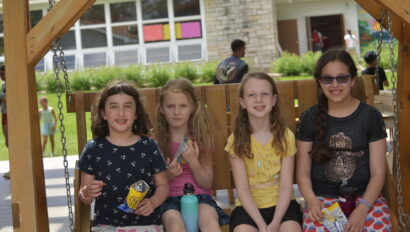Reflections on Parashat YitroBy Jacob Cytryn, Director
Yesterday, I returned from an annual trip to interview the single largest subset of our staff each summer: those currently residing in Israel. This year, the group will be bigger than ever as we expand our mishlachat (Israeli delegation) and welcome back nearly thirty North American veteran staff members who are learning in Israel. I will write much more about the details, personalities, and experiences from my twelve-day visit next week. This week, I want to focus on one of the outcomes of the trip, and a parallel phenomenon highlighted by this week’s Torah reading, parashat Yitro.
Meeting with over sixty candidates for staff over the last two weeks, I am struck, again, by the diversity of those who see Ramah in Wisconsin as an attractive setting to contribute their talents and energies. Meeting with them, as well as a handful of other Ramahniks based in Israel, pushes me to ponder the question of who we are as a camp, what we want to be and, perhaps most provocatively, who we want our campers and staff to become.
In this week’s Torah reading, we encounter, for the second time in two weeks, one of the unquestioned highlights of the entire Torah. While last week we read Shirat Hayam (the Song of the Sea, Exodus 15), this week we read the first iteration of the Ten Commandments (Exodus 20). There are widespread traditions in the Ashkenazic world to stand up for the reading of both of these crucial narratives in the formation of the Jewish people, representing the definitive redemption from Egypt and the cementing of our covenantal relationship with God. Standing up for parts of the Torah is a statement of values clarification – we are saying, with our bodies, that these sections of the Torah are somehow more important than others. As I learned last week, from the Director of the Ramah Israel Seminar, Rabbi Ed Snitkoff, arguably the most influential Jewish thinker of the last fifteen hundred years, Maimonides, adamantly felt that no section of the Torah should be privileged over any other one. In an answer to a question about how to navigate the tensions in Iraqi synagogues of the 12th Century on whether or not to stand up for the Song of the Sea, he instructed the leaders of the community for everyone to sit, even if it took physical force to do so.
Meeting with Israelis from every place on the wide religious and political spectra that define contemporary Israel, and long-time Ramah in Wisconsin veterans choosing to spend their gap years in programs that represent a wide swath of American Jewry, the parallels to our experience reading Torah during these two weeks are stark. In my own imperfect phrasing, I have been asking myself: which values of Camp Ramah in Wisconsin (or indeed of the entire Conservative Movement) belong on our own version of the “Ten Commandments,” and is there a specific value that may sit paramount above them all, that plays a role for us that the recitation of the Shema plays for us as Jews?
This mental exercise, in one form or another, is a popular programming choice at camp – asking campers or staff members to prioritize their own sense of what matters to them Jewishly. And doing so has far-reaching consequences for how we act, speak, and think. Indeed, an interesting parallel program would be analyzing, based on our behavior and words, what we express as our priorities – as opposed to those we only have to embrace theoretically.
I encourage all of us to ponder these questions for ourselves, because, though I have yet to settle on my own version of Ramah’s “Top Ten,” I do have a clear sense of our most important goal. That value, which I hope does not come as a surprise to anyone reading this, is that we set out to create thoughtful decision-makers about their life as modern Jews, well-rounded young people who have been exposed to and can therefore choose from much of the richness of our Jewish tradition for their own lives. In truth, these thoughtful alumni – products of the camp we can be proud of – may find themselves expressing the impact of their Ramah experiences (and those of their families, synagogues, schooling, and more) in vastly different ways, and for many of which we should feel equally prideful. Thus, during our interviews with new shlichim (Israeli staff) earlier this week, we regularly emphasized our more than dozen alumni who, in the last few years, have volunteered to serve in the Israeli armed forces; veteran shlichim who have been dramatically influenced by their time at Ramah and our approach to Judaism but who still live in the more familiar secular or religious Israeli frameworks; and all of our alumni spending the year in Israel, whether they are learning in Orthodox Yeshivot and institutions, on educational programs that do not provide the same robust adherence to Shabbat and prayer that Ramah does, or those studying on our partner program, United Synagogue’s Nativ College Leadership Program.
We, as heirs to the Torah and two millennia of Rabbinic Judaism, are similarly positively defined by the differently nuanced, sometimes even conflicting voices that make up our complex identity. Like the Torah and Rabbinic Judaism, we too have the boundaries that define the big tent in which we live, but the richness and power of our message is that the space within the tent can contain multitudes. At no point in the year am I as aware of this than representing our organization in Israel, and, as occurred this year, at no point in the year am I prouder of all that we represent and achieve.





